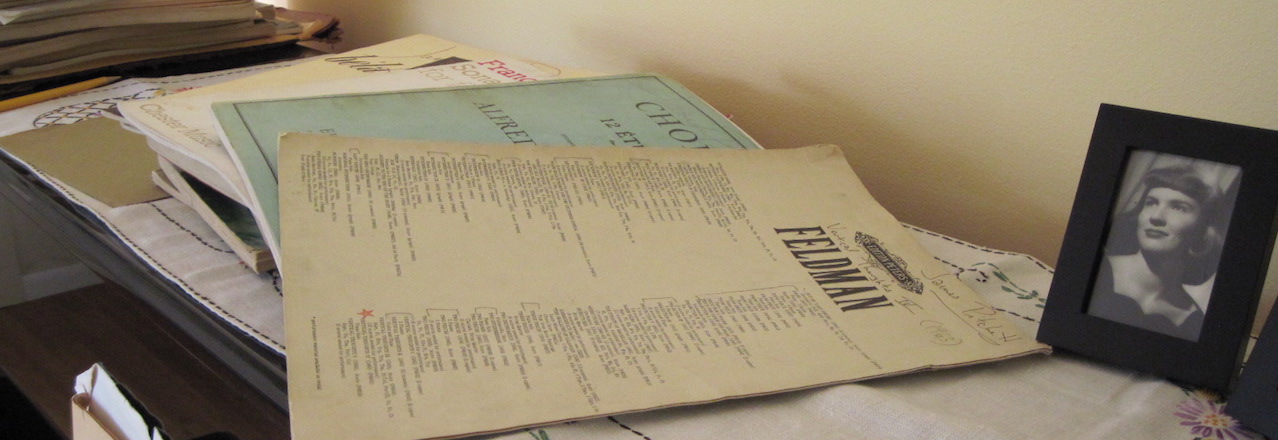After my previous post on Cage’s Cheap imitation, I have been thinking more about the piece and doing some poking around.
Kyle Gann’s blog has a post on “Cage in the mind’s repertoire”, in which he takes John Adams to task for saying that, while he found Cage to be hugely influential on his work, he never listens to it. Gann cites a bunch of his own favorite pieces, but Cheap imitation isn’t among them, although to me it would fit nicely in his playlist, which includes the String quartet in four parts and other similar works of the 1940s.
Of course, the source of this kind of comment is the old view that Cage is “more a philosopher than a composer”, which as far as I’m concerned is just thought-free babble. The people who say this, do they actually read the writings of philosophers? Don’t they actually listen to the music of composers? If they do, and if they’ve read Cage’s writings and listened to a goodly sample of the music, they’d never say such nonsense. But it’s just been the standard thing to say about Cage for so long that it just hops out of people’s mouths.
But this all made me think: what if Cage had been more like Ives? What if he had toiled in obscurity for years and was only discovered late in his life, after a large chunk of his work was done? And what if the first work anyone ever heard of his was Cheap imitation? If you started from Cheap imitation and then traced the history backwards and forwards from that, what would Cage’s reputation be? We’d take Cage’s love of music for granted: the simplicity, the gentleness and all of it. What does 4′ 33″ look like from that point of view? Where did all those precious philosophical ideas go?
I think that part of the “philosopher, not composer” judgment comes from the true story of what made Cage’s reputation. What made Cage famous was none of his music—maybe not even 4′ 33″—but rather the publication of Silence in 1961. I’d venture that 80-90% of everyone’s view of Cage comes from reading that one book. I’d even include myself in that statement (it was my first introduction to Cage, that’s for sure). I’m certainly aware of constantly having to watch out for the “Silence effect”: flattening Cage’s history in the way that the book does. By combining essays from the 30s, 40s, and 50s into a single undifferentiated mix, it leads to a monolithic view of Cage, that he was always the way he was in 1961. On various occasions when researching some article or another I’ve made it a careful point to read the writings in chronological order to counteract this and to put things into proper historical context. In any event, because Silence is what everyone discovered first, it has conditioned their view of Cage—that’s my theory.
Other random points about the piece:
- The orchestra version of Cheap imitation is notoriously difficult. It requires pinpoint coordination of the individual players without a conductor. To my knowledge, no professional orchestra has ever performed it. When I asked Cage around 1990 or so about performances, he said that a couple of student orchestras had played parts of it, but that was it. I wonder if anyone is game to try it for the Cage centennial in 2012? If I dare an orchestra to do it, will someone rise to the challenge? I personally doubt that the leader of any orchestra, professional, student, or amateur, has the guts, talent, and discipline to do it—there, I double-dog-dared ’em! Anyone from Orpheus listening?
- The journal Tempo published an article in 2009 by Marc Jensen on “The role of choice in Cheap imitation“. I’m glad to see someone paying attention to the piece, and I found out a couple of things that I didn’t know about it.
- Ubuweb includes the description of the process of composition (as given in the preface to the score) under the rubric “conceptual writing”. This makes absolutely no sense to me, but then I’m not a very conceptual guy.
- And as if piano, violin, and orchestra weren’t enough, Teodoro Anzellotti has done a version for accordion.

Pingback: Looking deeper into John Cage's Cheap Imitation - James Pritchett